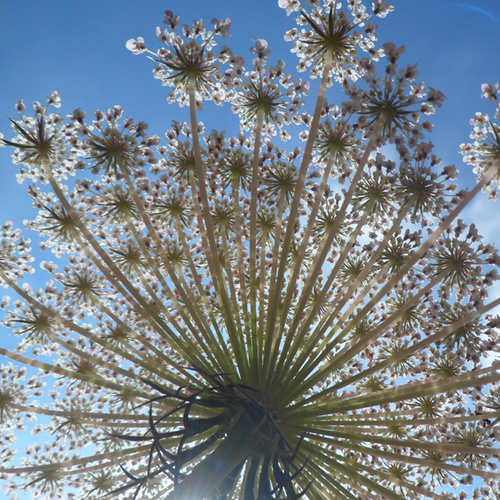
Background
People use khella for conditions such as asthma and other lung problems, diseases of the heart and blood vessels, diabetes, menstrual pain, and many others, but there is no good scientific evidence to support these uses.
Be careful not to confuse khella with its less commonly used relative, bishop's weed. The two species contain some of the same chemicals and work similarly in the body, but khella is more commonly used for heart and lung conditions, and bishop's weed is more commonly used for skin conditions.
Safety Safety definitions
When applied to the skin: There isn't enough information to know if khella is safe to use when applied to the skin.
Special Precautions & Warnings:
Pregnancy and breast-feeding: It's LIKELY UNSAFE to take khella if you are pregnant. It contains khellin, a chemical that can cause the uterus to contract. This might cause a miscarriage.It's also best to avoid khella if you are breast-feeding. There isn't enough information to know if it is safe for the nursing infant.
Liver disease: Khella might make liver disease worse. Don't use it if you have liver problems.
Effectiveness
- Scaly, itchy skin (psoriasis): Early research suggests that taking khellin, a chemical in khella, by mouth in combination with sunlight exposure helps clear skin sores in people with psoriasis.
- A skin disorder that causes white patches to develop on the skin (vitiligo). Some research shows that taking khellin, a chemical in khella, by mouth or applying it to the skin can improve skin discoloration when used along with ultraviolet light therapy. But not all research agrees. Also, some research shows that khellin therapy requires longer treatment durations and higher light doses in order to have a similar effect to psoralen plus ultraviolet light therapy (PUVA). PUVA is an accepted medical treatment for vitiligo.
- Stomach cramps.
- Kidney stones.
- Menstrual cramps.
- Premenstrual syndrome (PMS).
- Asthma.
- Bronchitis.
- Cough.
- Whooping cough.
- High blood pressure.
- Irregular heartbeat (arrhythmias).
- Congestive heart failure (CHF).
- Chest pain (angina).
- "Hardening of the arteries" (atherosclerosis).
- High cholesterol.
- Other conditions.
Dosing & administration
Interactions with pharmaceuticals
Digoxin (Lanoxin)
Interaction Rating=Moderate Be cautious with this combination.
Digoxin (Lanoxin) helps the heart beat more strongly. Khella seems to slow the heartbeat. Taking khella along with digoxin might decrease the effectiveness of digoxin. Do not take khella if you are taking digoxin (Lanoxin).
Medications that can harm the liver (Hepatotoxic drugs)
Interaction Rating=Moderate Be cautious with this combination.
Khella might harm the liver. Taking khella along with medication that might also harm the liver can increase the risk of liver damage. Do not take khella if you are taking a medication that can harm the liver.
Some medications that can harm the liver include acetaminophen (Tylenol and others), amiodarone (Cordarone), carbamazepine (Tegretol), isoniazid (INH), methotrexate (Rheumatrex), methyldopa (Aldomet), fluconazole (Diflucan), itraconazole (Sporanox), erythromycin (Erythrocin, Ilosone, others), phenytoin (Dilantin), lovastatin (Mevacor), pravastatin (Pravachol), simvastatin (Zocor), and many others.
Medications that increase sensitivity to sunlight (Photosensitizing drugs)
Interaction Rating=Moderate Be cautious with this combination.
Some medications can increase sensitivity to sunlight. Khella might also increase your sensitivity to sunlight. Taking khella along with medication that increase sensitivity to sunlight could increase the chances of sunburn, blistering or rashes on areas of skin exposed to sunlight. Be sure to wear sunblock and protective clothing when spending time in the sun.
Some drugs that cause photosensitivity include amitriptyline (Elavil), Ciprofloxacin (Cipro), norfloxacin (Noroxin), lomefloxacin (Maxaquin), ofloxacin (Floxin), levofloxacin (Levaquin), sparfloxacin (Zagam), gatifloxacin (Tequin), moxifloxacin (Avelox), trimethoprim/sulfamethoxazole (Septra), tetracycline, methoxsalen (8-methoxypsoralen, 8-MOP, Oxsoralen), and Trioxsalen (Trisoralen).
Interactions with herbs & supplements
Herbs that contain cardiac glycosides: Some herbs contain chemicals called cardiac glycosides, which are similar to the prescription drug digoxin. These chemicals affect the heartbeat. Khella might decrease the effect of these chemicals on the heart. Herbs that contain cardiac glycosides include black hellebore, Canadian hemp roots, digitalis leaf, hedge mustard, figwort, lily of the valley roots, motherwort, oleander leaf, pheasant's eye plant, pleurisy root, squill bulb leaf scales, star of Bethlehem, strophanthus seeds, and uzara.
Herbs that might increase sensitivity to sunlight: Khella may increase the chance of getting sunburned outdoors. Using it along with other herbs that have this same effect, such as St. John's wort, might increase the chance of getting sunburned. Avoid this combination.
Interactions with foods
Action
Several prescription drugs including amiodarone, nifedipine, and cromolyn have been developed from khella.




